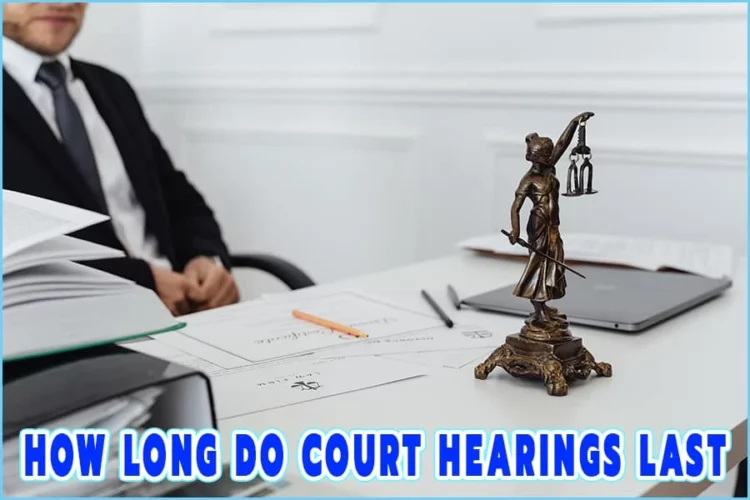Generally, a court hearing is different from a trial in that it’s often less formal and shorter. In the litigation process, it’s usually oral arguments. The main purpose of court hearings is to see if it can resolve an issue without trials.
There are different types of hearing, each with specific names. Each type of court hearing tells the proceeding stage and purpose of the hearing. Before a hearing, the court will inform you about the time and place of the hearing.
The article has more information about the court hearing time and begins by answering the question.
How Long Do Court Hearings Last
Notably, hearings are shorter than trials. A typical hearing can take one to two hours, while others last for several minutes or days.
It all depends on the amount of evidence and available evidence. On the other hand, trials can last for weeks, days, or hours.
Type Of Court Hearings
As mentioned, there are different types of the court hearing with different names. The name of a court hearing will tell the proceedings stage and purpose of the hearing. Here is a list of the different types of court hearings.
First Appointment
In this hearing, the court considers the parties’ applications for the first time. The court then looks at the applications to find out more about each party’s position. At this stage, the court encourages the parties to make an agreement if possible.
If the parties fail to reach an agreement, the court will ask them to bring more evidence. The parties will also have to arrange for another court hearing.
Fact-Finding Hearing
The hearing is mostly applicable in allegations of child abuse or domestic violence. It’s because most of these allegations are usually unclear. Therefore, it makes it hard for the judge to know whether they are true.
Such unclear circumstances might make the judge list a fact-finding hearing. However, courts only arrange for fact-finding hearings when sure they won’t properly decide the case ruling without truth.
Financial Dispute Resolution
This hearing aims to encourage parties to agree on their finances. During this hearing, the judge checks all the documents and positions of the parties. However, it’s not the final hearing, and thus the court won’t make a final decision.
However, it will inform the parties of the possible outcome if there’s a final hearing. If the parties reach an agreement, the court will approve that as the final order.
Where Do Do Court Hearings Happen?
Typically court hearings happen in courtrooms. These courtrooms usually have equipment that records court proceedings. It’s the role of the judge to decide whether the hearing will happen in public or private.
If the hearing happens in public, then it means that a public member can be present at the hearing.
However, in this situation, the court needs to have sufficient room. Only the parties involved, witnesses, and advocates will be present if the hearing happens privately.
Things That Happen In Hearings
During the hearing, the judge normally hears out the claimant first. A claimant is simply the person who did start the case or made the application. The judge then hears out the defendant, the individual disputing the case.
A defendant needs to have solid evidence to help the judge decide whether they are telling the truth or not.
The claimant and the witnesses must take an oath before the court to ascertain what they are saying is true. You’ll be making a legally binding commitment by swearing before the court.
When Does The Judge Make A Decision?
Normally the judge makes the final decision after considering all the evidence. The court will send a letter with the ruling decision after the hearing. Note that it won’t highlight the reasons for the judge’s decision.
The judge can instruct you to do something like preparing evidence for the next hearing or paying the other party. It would help if you followed all the instructions immediately and did not wait for the written order.
The Best Tips For First Court Hearings
1. The Basics
In as much as court hearings aren’t usually that long you need to prepare yourself adequately. Firstly, ensure you have a good night’s sleep before the hearing. Please take a full and healthy breakfast to keep your brain at its best.
Court hearings involve a lot of questioning and answering. In addition, you need to rehearse with your attorney about what you’ll say in the hearing.
It’ll be best to meet the attorney a day before the court hearing. In the meeting, you’ll be able to run through your cross-examination and talk about what you expect.
You should perfectly organize your documents, more so if you represent yourself. Outline all your arguments well to use the notes in case of a mental freeze.
Remember to dress respectfully, conservatively, and professionally. Overall a person’s appearance matters a lot and shows your level of respect to the court. Dress like someone who’s going for an interview.
To dress nicely does not necessarily mean a suit; several clothes out here will make you look nice.
2. Be Sensitive On the Judge’s Perspective
You need to understand that the number of judges is too low due to budget restraints. Therefore, their daily calendar is so jammed. It means that your hearing is one of the ten or more on the court’s calendar for the day.
The judge has certainly had one case like yours or worse in hundreds or thousands of cases. Overall, the judge’s responsibility is to effectively and efficiently decide on the case. Regardless of the decision, it’s better to understand that the judges are also human.
Therefore, they do have their issues outside the courtroom. Thus, the judge might have some biases overtime after different rulings like any other person. Before a court hearing, it’s advisable to conduct extensive research about the judge.
Please find out more about their background and the outcomes of their other cases. You will understand the judge’s experiences, beliefs and how they affect their ruling. Don’t expect the judge to be soft on you if you represent yourself.
The judge’s role isn’t to advise you about the law but to give a ruling on it.
3. Conduct in The Court Room
It would be best to arrive at the court at least an hour early. On the hearing day, you might be missing some important court papers or files.
In that case, arriving earlier will allow you to visit the central clerk’s office and file the documents. Usually, most courthouses in the USA open by 8 am, and hearings start at 9 am.
Do not carry any metallic object to the court because it’ll automatically set off the detector. While going through the detector, you can ask the bailiff where your courtroom is. It helps save your time.
Always put your mobile phone off while in the courtroom and turn off the vibrate mode. Some judges get so irritated with mobile phone disturbances.
It shows that you’re disrespectful to the courtroom. The bailiffs can even confiscate the mobile phone if it rings during the hearing.
4. Addressing The Court
It’s cordial to address the court using respectful words; for example, address the judge as your honor.
Always talk when it’s your turn to talk, and don’t interrupt the judge, your attorney, or the opposing party. Avoid talking to the opposing party when their attorney addresses the court.
That’ll surely be disrespectful to the courtroom. Carefully listen and answer the question accordingly.
You should never delay or evade answering the judge’s questions, and your answers should be short and precise.
Avoid rolling your head or shaking your head anytime the opposing party or counsel tells a lie. Do stay composed and show that you are a reasonable and rational person. Being emotional or crying will show that your lack restraints and control.
5. After The Hearing
Regardless of the result, it’s best if you always remain composed. You should never cry and gloat or even come out of the courtroom because the ruling isn’t in your favor.
Plus, it would help if you thanked the judge and other court staff for putting their time into hearing your case.
Confirm whether you have to remain after the hearing to get any papers. Then ask your attorney to debrief you before leaving.
Conclusion
How long do court hearings last? This is a question mist people with court hearings usually want to know.
The court hearing is simply a procedure before a court or higher authority. In the legal action, the trial happens when parties in dispute come together and present their evidence.
Unlike trials, court hearings are much shorter and also less formal. In addition, there are different types of court hearings, and each has a different name and purpose.










